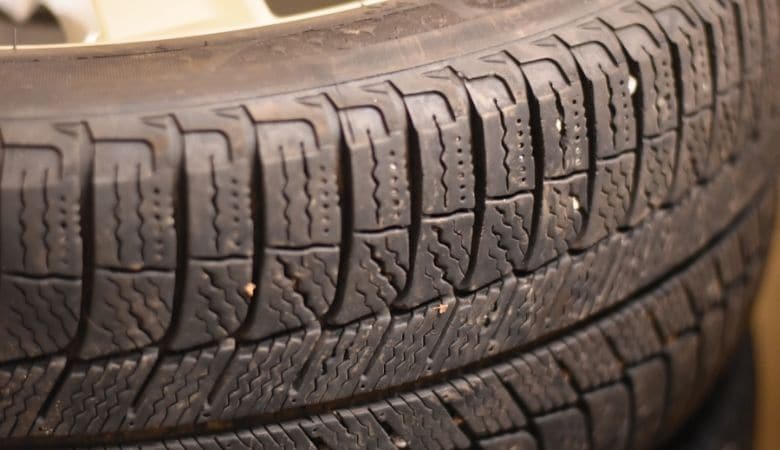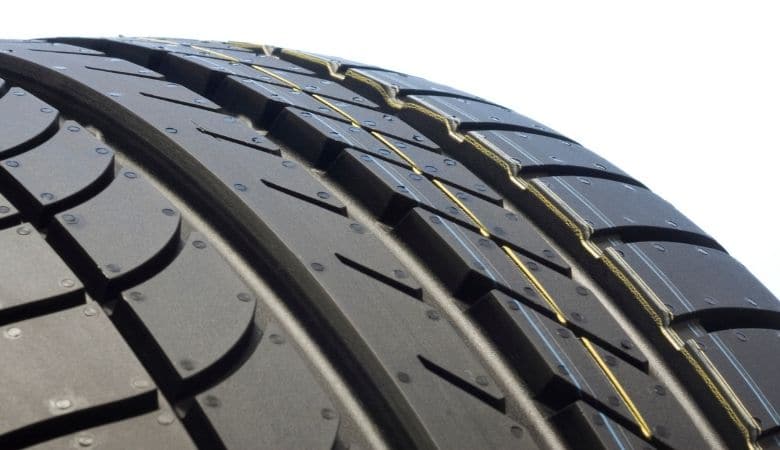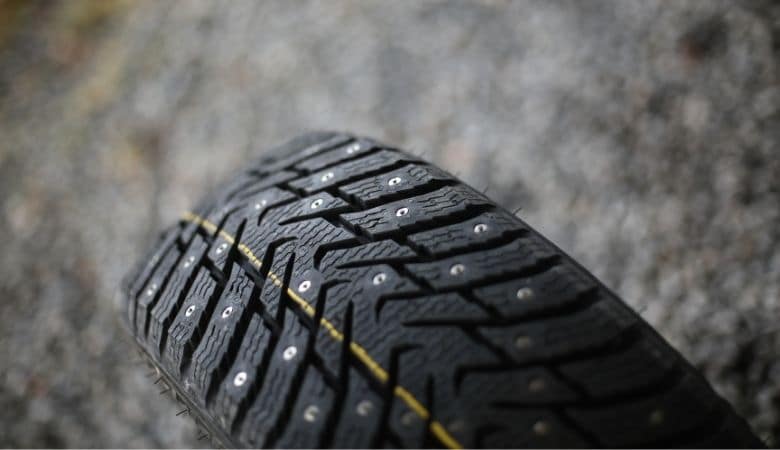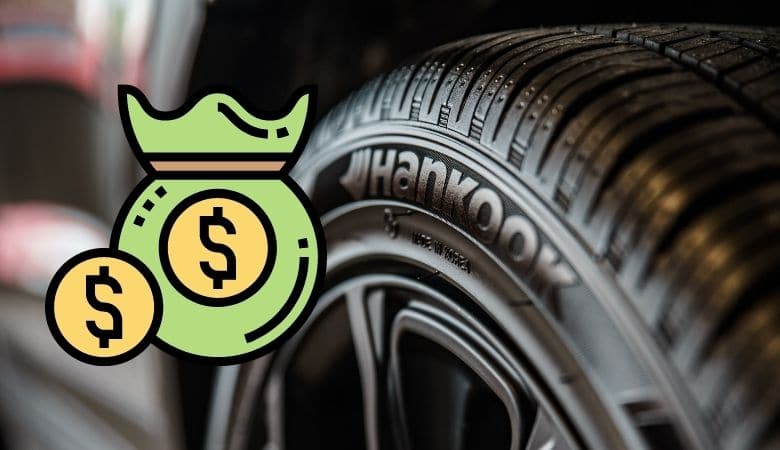Tires are essential when it comes to driving your car, so you want to make sure that you’re buying the right set of tires for your vehicle.
Most tires last anywhere from 12,000 to 40,000 miles before needing replacement, but the type of tire you choose can impact how long they last and how safe they are to drive on.
If you’re in the market for new tires, you might be wondering how much they cost and which type of tire is the best value. Thankfully, there are many variables to consider when choosing new tires, making it possible to find high-quality tires at every price point.
This article will explain how much you can expect to pay based on the type of tire you are looking for and what factors that affect the cost. You’ll also learn how to extend the life of your tires so that you don’t have to buy new ones unnecessarily often.
Interested in what the average tire installation cost is? Check out this post.
*The prices listed in this post is an estimated average
All-Season Tires

The average replacement costs for all-season tires are between $150 and $180 per tire. However, prices vary depending on the brand, quality, size, and application. The best deal may be to buy from a discount chain like Costco or Walmart although, there is no guarantee that these low prices will last long.
Buying direct from a manufacturer like Goodyear can also save you some cash since manufacturers typically offer warranties that protect against price fluctuations over time.
According to Consumer Reports, buying midgrade premium models often gets you more miles per gallon and less rolling resistance than budget models from less well-known brands, so check those out first if saving money is a top priority for you.
Touring Tires
The average price for touring tires is about $500 per tire. The range for touring tires runs from about $150 to $800, averaging around $500. You might spend more if you purchase a premium brand and less if you opt for basic brands.
Touring tires are designed to last longer than regular tires. They feature stiffer sidewalls and don’t carry as much air pressure, which also means they won’t be as smooth over rough roads as regular, high-performance street tires would be.
The tradeoff is that touring tires are better suited to long trips because they’re harder-wearing and offer greater protection in bad weather conditions like rain or snow than other kinds of tires would. They can also handle more weight when loaded up on trailers.
If you’re looking for a tire that will help your family get out and enjoy some camping trips every year, touring tires is likely a good choice. If you want something smoother, choose another type of tire.
Summer Tires

Most drivers should keep their tires in good condition and replace them every five years for optimal performance and safety. Summer tires, which have harder rubber compounds than other season tires, should be replaced after four to six years, as driving on these for extended periods can cause excessive wear.
The cost of summer tires are approximately $200-300 per tire, including installation. This may vary depending on location. You can also rent a set of replacement tires if you’re planning to drive only in warmer weather; however, some auto insurers won’t provide coverage if your vehicle is outfitted with summer-only tires.
Rental rates for new summer tires range from $300 to $500 per month or more, not including delivery. If you don’t know how long you’ll need them for, renting makes sense because buying extra tires isn’t practical due to limited storage space in many cars and trucks.
Highway Tires
The average price for highway tires are $100 to $300 per tire, depending on brand, quality and size.
Highway tires have the same kind of tread properties as all-season tires, but they are made specifically for heavier vehicles such as SUVs and light trucks. They are made in a way that makes them comfortable to drive on the pavement.
Rib Tires
The price of rib tires usually range between $120 to $300 per tire on average.
Rib tires, found on many sports cars and sedans, offer better handling because they have stiffer sidewalls to keep them upright when cornering at high speeds. They also have more tread in contact with road surfaces, so they perform better in wet conditions.
Most performance tires are ribbed due to these properties, but you may also find them on vehicles used for sprint racing, where lightweight is valued over comfort. Automakers typically equip new models with small but sturdy tires that improve fuel economy by requiring less rolling friction.
All-Terrain Tires or Mud-Terrain Tires

All-terrain tires can range from $75-$300 per tire. The more money you spend on better quality models, however, there may be fewer issues down the line because they last longer overall and have a better performance rating.
No matter what vehicle you drive, having an SUV or a truck with good tires can make all the difference when you’re driving off-road. Mud-terrain tires are built to provide traction and stability on slippery surfaces.
Since all-terrain tires are ideal for handling mud and other tough road surfaces like snow or rocks. These may wear out quicker than standard car tires unfortunately, some motorists don’t know that until after purchase because advertisements do not always clarify what type of driver they are aimed at.
Performance Tires
Performance tires can be more expensive than other tires, but if it keeps you safer on the road, then it’s worth it. The price of performance tires ranges from $200 to $1,040 on average.
Performance tires are very similar to summer tires and they are built with special tread patterns and rubber compounds that allow them to grip better on dry surfaces. They are also stiffer which provides better control of the vehicle in tight curves compared to other tires.
Winter Tires

If you live in a place that gets heavy snowfall, especially during December through February, it’s probably worth investing in a set of winter tires. If you live in one of five states—New York, Pennsylvania, Michigan, New Hampshire, and Vermont—you may be required to have them.
Winter tires typically grip much better than normal tires and can improve your vehicle’s traction on slick surfaces by about 30 percent.
The downside is that they’re pricey—winter tires can cost $300 or more per tire. But many times, insurers will offer discounts for having them. Plus, they pay off quickly. According to Consumer Reports, drivers saved $400 in decreased repair costs over two years after switching from summer to winter tires on SUVs and pickup trucks driven in snow country.
A new set of snow tires might cost up to $1,200 but are considerably cheaper when purchased used or through a retailer that offers layaway options.
It’s probably worthwhile spending the money on snow tires if you live in an area where they’re required during certain seasons —or even year-round—or if you live at higher elevations where it snows more frequently.
If needed, winter tire chains are an additional expense that adds hundreds of dollars to your bill but will help reduce stopping distances during snowy conditions by 30 percent or more compared with standard all-season tires.
As with any new purchase, get quotes from several providers before making your decision check local laws as well—some car dealerships have special contracts with tire providers.
Spare Tires
Almost all cars, vans, and SUVs have a spare tire. Spare tires typically aren’t as wide or large as standard tires and can be purchased for less than $100.
If your car or SUV is new enough to come with run-flat tires, those will act as spares. Most people replace their spare every two years since they seldom get used.
Talk to your local auto shop about how long yours should last and how much it would cost to replace one if necessary. And remember, since few people use their spare, skip gimmicky add-ons like fancy wheels or expensive paint jobs.
Hi, my name is Niklas, the head content creator & CEO of Whirling Wheelz. I am very interested in vehicles of all kinds, mainly cars. I have a car mechanics degree from high school and a big hobby of mine is to follow the WRC (World Rally Championship) both online and through travel.


